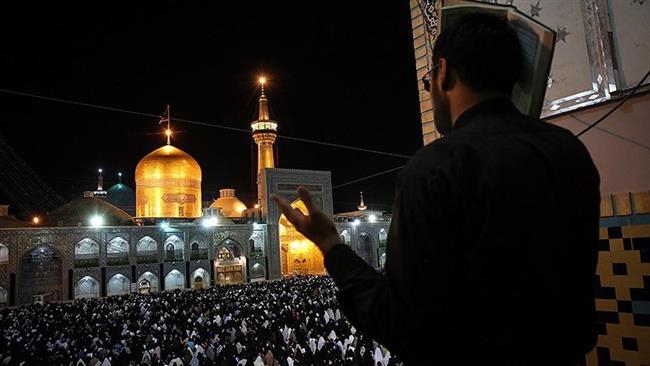Millions of black-clad people from different social backgrounds have converged in mosques, places of worship and religious sites nationwide to attend Shia mourning rituals.
During the ceremonies, poems are recited and sermons delivered in honor of one of the most revered figures of Shia Islam.
Imam Ali was struck in the head with a poisonous sword by Ibn Muljam while he was saying his prayers in the Great Mosque of Kufa, which is located in Iraq now, on the 19th of Ramadan 40 AH (27 January AD 661). He passed away two days later.
[caption id="" align="aligncenter" width="555"]
 Iranian Muslims ask for divine forgiveness during the Laylat al-Qadr (Night of Destiny) at the courtyard of the holy shrine of the eighth Shia Muslim Imam, Ali ibn Musa al-Reza (PBUH), in the city of Mashhad, northeastern Iran, June 26, 2016.[/caption]
Iranian Muslims ask for divine forgiveness during the Laylat al-Qadr (Night of Destiny) at the courtyard of the holy shrine of the eighth Shia Muslim Imam, Ali ibn Musa al-Reza (PBUH), in the city of Mashhad, northeastern Iran, June 26, 2016.[/caption]Imam Ali, Prophet Muhammad�s son-in-law and cousin, is highly respected for his courage, knowledge and deep loyalty to the Prophet as well as for administering justice.
Imam Ali�s martyrdom is a national day of mourning in Iran.
The night before his demise is believed to be one of the three holy nights known as the Laylat al-Qadrs (the Nights of Destiny), which represent an unparalleled opportunity for Muslims to dedicate much of their time to praying.

Leader of the Islamic Revolution Ayatollah Seyyed Ali Khamenei is seen during mourning rituals on the eve of the martyrdom anniversary of the first Shia Imam, Ali ibn Abi Talib (PBUH), Tehran, Iran, June 26, 2016. (Photo by khamenei.ir)The Night of Destiny is believed to be the night when the first verses of the holy Qur�an were revealed to Prophet Muhammad (PBUH) more than 14 centuries ago.
It is also thought to be the night when the blessings and mercy of God are abundant, sins are forgiven, supplications are accepted, and God decides the fate of people for the coming year.
Throughout the Night of Destiny, Muslims recite the holy Qu�ran, hold vigils until dawn, and pray.
By Press TV











